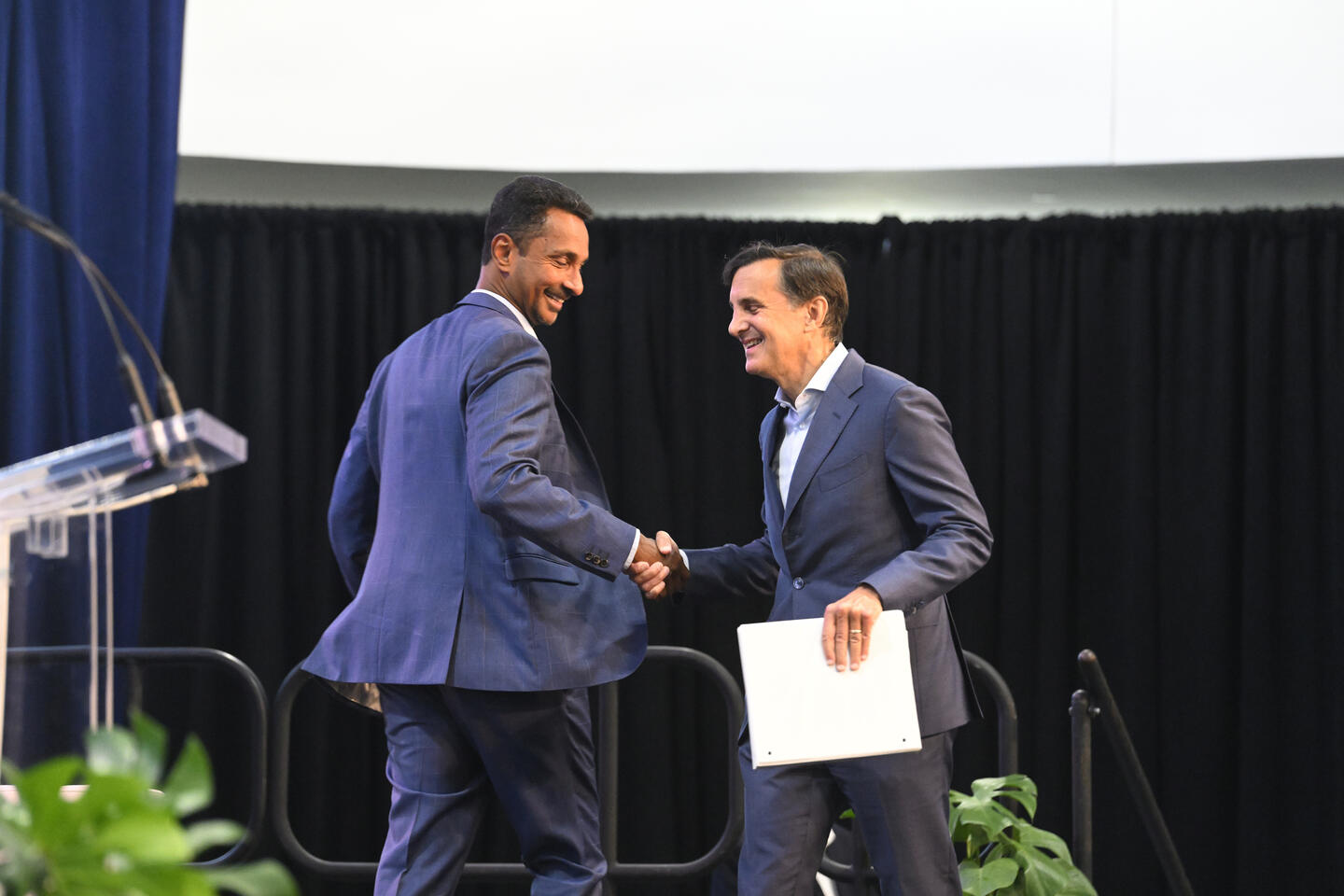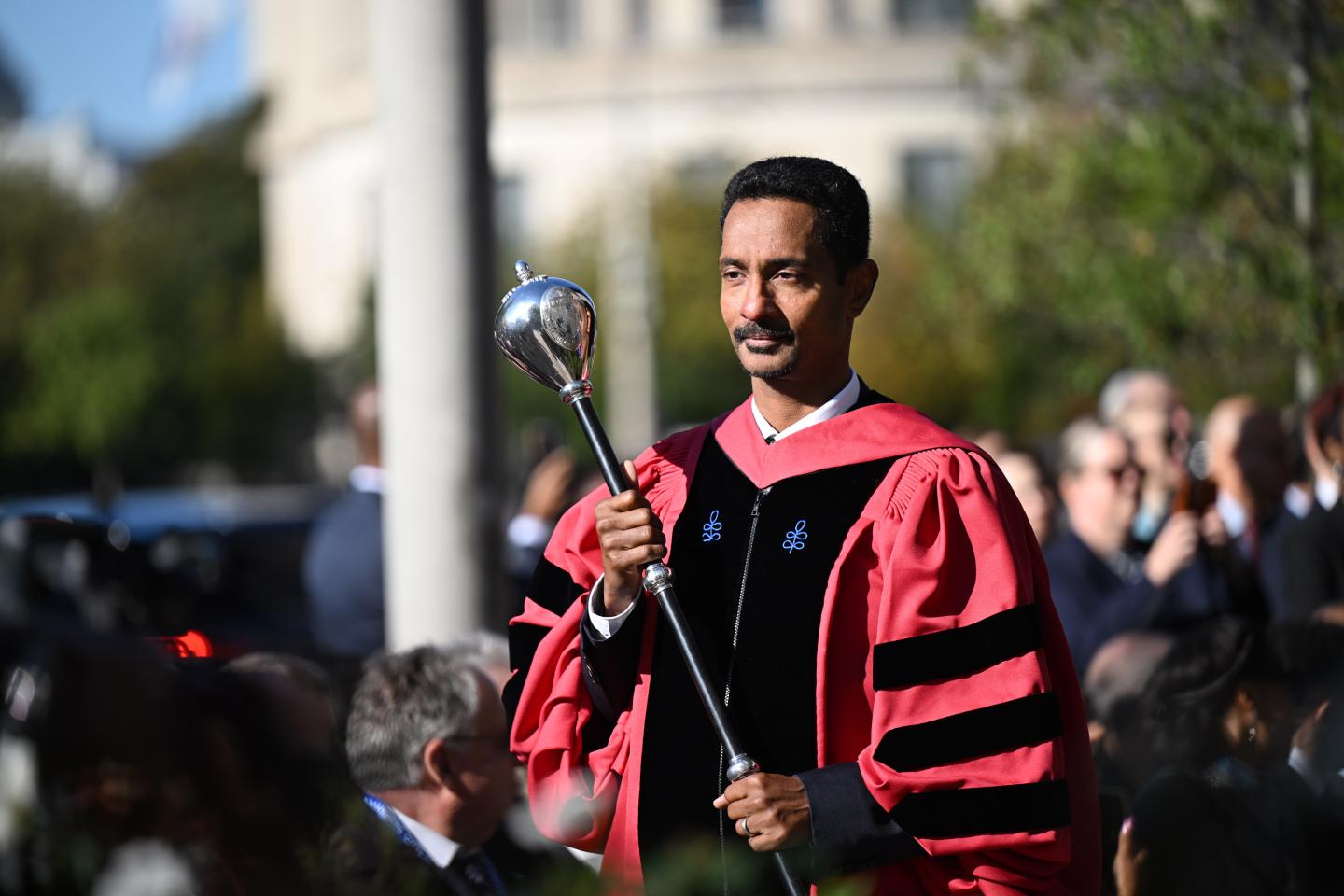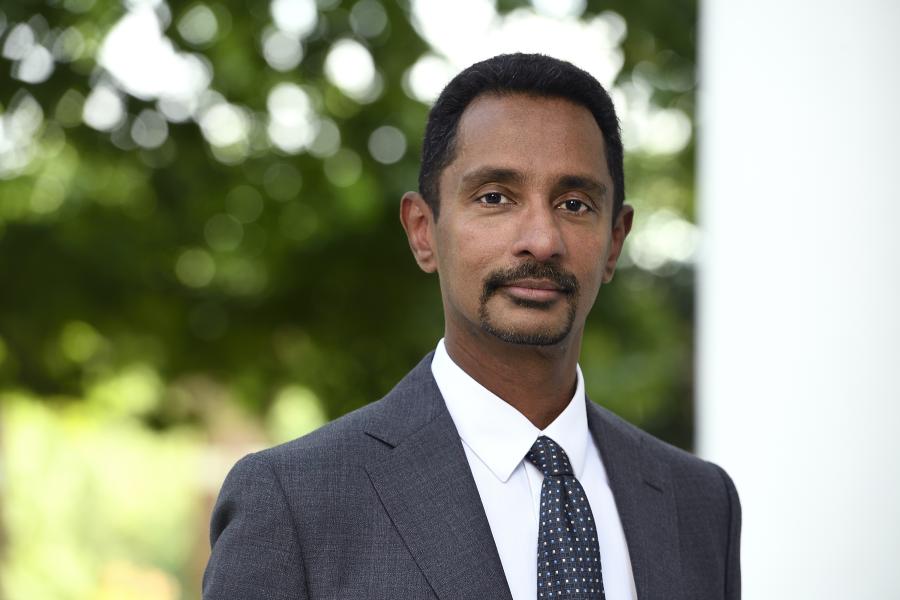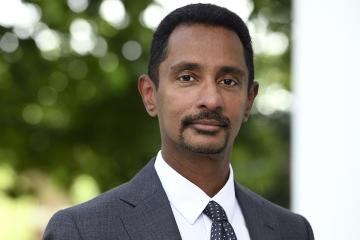In his scientific career, Ray Jayawardhana, known as RayJay to many in the astronomy community, has used the world's largest telescopes to explore planetary origins and characterize alien worlds. He is intimately involved with addressing what can only be described as one of humanity's greatest questions: Are we alone in the universe?
In his role as the provost, Jayawardhana also takes on big issues, guiding an expansive portfolio to advance discovery, learning, and engagement across the university's many divisions and disciplines.
Jayawardhana started his position as Johns Hopkins University's provost a little over a year ago. An accomplished academic leader, renowned and widely published scientist, and award-winning author, he served previously as dean of Cornell University's College of Arts and Sciences where he led Cornell's largest and most academically diverse college, focused on strategic priorities in faculty renewal and support, research and creative excellence, academic innovation and the student experience, and public engagement and impact. While at Cornell, he oversaw the recruitment of 130 new faculty members and 65 endowed professorship appointments, adopted a new undergraduate curriculum, expanded first-year advising seminars, and implemented a selective and prestigious program that pairs liberal arts pursuits with the study of technology and data. He also established a set of coveted postdoctoral fellowships for outstanding emerging scholars as well as a curated humanities scholars program and a signature summer research program for undergraduates, while elevating public and media engagement dramatically. During his tenure, the college set consecutive fundraising records, raising more than $300 million in philanthropic support.
Image caption: Provost Ray Jayawardhana speaks at the Catalyst and Discovery Awards celebration in October 2023.
Image credit: Will Kirk / Johns Hopkins University
As provost at Johns Hopkins, he serves as the university's chief academic officer, working closely with President Daniels, the deans, and leaders across JHU on academic initiatives, opportunities for students, and key priorities that support the university's research and education missions. A native of Sri Lanka, Jayawardhana earned a bachelor of science degree in astronomy and physics from Yale University and a PhD in astronomy from Harvard. He is the winner of numerous awards and accolades, including a Guggenheim Fellowship, a Rutherford Medal in Physics from the Royal Society of Canada, and a Carl Sagan Medal from the American Astronomical Society's Division of Planetary Sciences. Asteroid (4668) Rayjay is named after him.
He is also an acclaimed writer whose articles have appeared in The Economist, The New York Times, and The Wall Street Journal. He is the author of four books, including Strange New Worlds: The Search for Alien Planets and Life beyond Our Solar System; Star Factories: The Birth of Stars and Planets; Neutrino Hunters: The Thrilling Chase for a Ghostly Particle to Unlock the Secrets of the Universe, that won the Canadian Science Writers Association's Book Award; and Child of the Universe, a children's book meant to spark the same fascination with our universe that inspired him as a child.
The Hub recently sat down with Jayawardhana to talk about his first year as provost, his research, and what lies ahead both for him and the university.

Image caption: Provost Ray Jayawardhana and JHU President Ron Daniels in August
Image credit: Will Kirk / Johns Hopkins University
You came to Hopkins from Cornell about a year ago. What was it that drew you to Hopkins?
A big part of why I came to Hopkins is the incredible momentum of this place at this moment in time. The pace of growth, progress, and innovation across our schools is truly remarkable and, one could argue, unparalleled amongst our peers. There's never been a better time to be at Johns Hopkins. The opportunity to be a part of that transformative effort is both exciting and humbling.
What is front and center for you in your second year as provost?
I'm thinking a lot about the university we want to be, academically speaking, in five to six years' time and the goals laid out in the Ten for One to achieve that vision. In terms of my priorities from the provost's seat, I'm especially focused on the initiatives that strengthen the academic enterprise. The provost's team plays a critical role in advancing and elevating many of the big initiatives that support the university's ambitions.
At the heart of this effort are investments in our academic talent, programming, and infrastructure that fuel discovery and impact and enhance student experiences and opportunities. For example, there are new investments in expanded faculty lines in the Krieger School of Arts and Sciences, and the data science and AI initiative, centered in the Whiting School of Engineering, through which we will deploy 80 new faculty hires plus 30 new Bloomberg Distinguished Professorships. And we're launching the new School of Government and Policy, which will be housed at the Hopkins Bloomberg Center in Washington, D.C. Several other new landmark buildings are being constructed across our campuses in Baltimore that will amplify the our research and teaching further.
We've also launched programs that are opening up new opportunities for impact, like the recently announced Provost Fellows for Public Engagement and last summer we kicked off a new Taskforce on the Arts, which I hope will not only elevate the role of the arts on campus, but also strengthen ties with local, national, and international communities and partners. Johns Hopkins Medicine is in the midst of a significant transformation, and I'm partnering with Dean DeWeese, President Daniels, and others to support that work. As the chief academic officer of the institution, all of this relates to what I see as immediate priorities for the coming year, to set these initiatives up for success, and ultimately to ensure they enable the overarching vision laid out in the Ten for One.
Higher education has been highly politicized the past few years. There seems to be a growing distrust of academia and science these days. How do we counteract that?
For me, growing up in Sri Lanka, the top American universities were sort of beacons on a hill. They really had an outsized influence on my view of the United States, and I think an outsized impact on the nation's economy and preeminence in research and innovation. I think institutions like Hopkins play an incredibly vital role in our democracy, in our society. So it's incumbent upon us to engage proactively with as broad a swath of our fellow citizens as possible.
My interest in public engagement connects to this aspiration. That means welcoming the entirety of the nation's population to our campuses, and engaging here on campus and out in the world with a wide range of communities. This is part of the motivation for the Provost's Fellows program, to empower our faculty to share the significance of their research with broader audiences, to bring their expert voices to the public conversations. I think we can be more thoughtful and more deliberate in our efforts to be truly inclusive across a variety of dimensions. To remain relevant and impactful, I think institutions like Johns Hopkins have the opportunity and the imperative to engage broadly, to be welcoming, to be proactive.
Switching more to your intellectual realm, Johns Hopkins is involved in quite a large number of major space and astronomy projects and missions. The Dragonfly mission to Titan, Parker Solar Probe, the James Webb Space Telescope, flights to the moon, just to name a few. Tell us a bit about your research.
My research group is focused on characterizing planets around other stars and investigating the origins and diversity of stars, planets and brown dwarfs. We use large telescopes on the ground, primarily in Hawaii and Chile, and in space to make observations. I've been involved with developing one of the four scientific instruments for the James Webb Space Telescope, called NIRISS. It's being used to investigate atmospheres of exoplanets, to take measure of their compositions and conditions, to understand how the Earth and our solar system stack up in a cosmic context, and to pave the way to looking for signs of life elsewhere someday.
It's been a very exciting time in our research. A postdoc from my group recently led a paper that reported the discovery of free-floating planetary mass objects in a nearby young star cluster. Our findings aim to explore the lowest mass objects that can form the way stars do, from contracting clouds of gas and dust. A former PhD student led a study of an ultra-hot Jupiter using a new high-resolution spectrograph on the Gemini South telescope.

Image caption: JHU Provost Ray Jayawardhana takes part in the dedication ceremony at the Hopkins Bloomberg Center in October 2023.
Image credit: Howard Korn for Johns Hopkins University
How does your academic background influence how you approach your work as Provost?
Well, I'm a scientist at heart so curiosity has always been my motivation. I'm trying to bring that same ethos to my role as provost—thinking about where we can push boundaries, where we can be bold and open up opportunities for learning and discovery in new ways. That's my fundamental guiding principle. When people bring me new ideas or I'm working on some administrative issue, I always want to engage intellectually. What's interesting about this? What's the core of the idea and how can we go about it in a way that is hopefully something different from how others are doing it, to enhance positive impact?
What about on a more personal level, you're new to Baltimore. What about time for your hobbies and pastimes, and learning a new city?
I used to run on the waterfront of Cayuga Lake in Ithaca, and I'm enjoying finding running paths around Baltimore, including the trails near Lake Roland. I've also been taking tennis lessons—that's keeping me humble! It's been fun getting to know Baltimore and Washington, D.C., with our kids, and connecting with friends in the area.
Posted in University News, Voices+Opinion
Tagged ray jayawardhana









